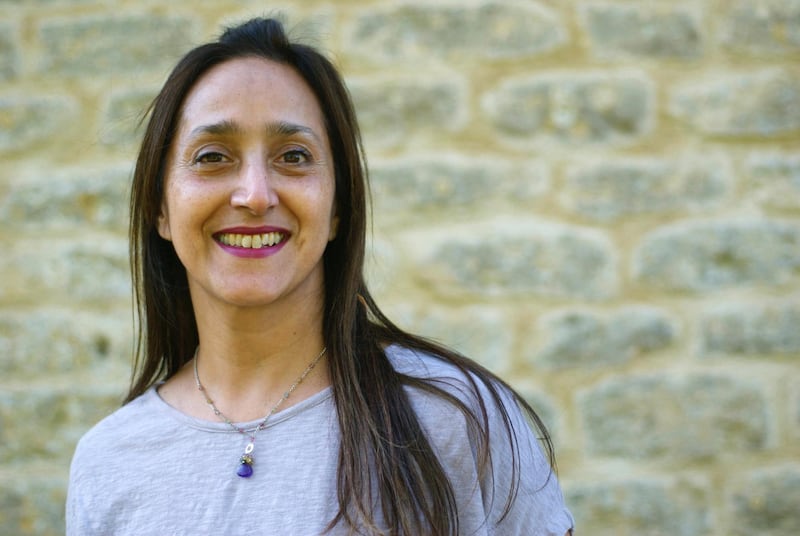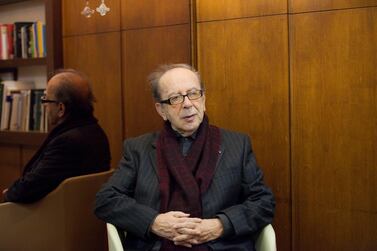Jasbinder Bilan can remember the exact moment inspiration struck for her first children's novel. "It came to me in one really clear image," she explains from her home in Bath, England. She says she saw a girl in India playing with water she had collected from a well. The girl could have been her, Bilan explains, had she remained in India, or perhaps her grandmother. "What I did know was that her story would have something magical in it."
Her book, Asha & The Spirit Bird, has certainly wielded its magic, both for Bilan and her memorable 11-year-old protagonist, who goes on a wild adventure across the Himalayas to find her father.
This month, it won the Costa Children's Book Award, an annual literary competition that recognises works in English by writers in the UK and Ireland. In some circles Bilan has been pegged as the favourite to win the overall Costa Book of the Year prize on Tuesday, when she's up against the other category winners. That would put her in the same company as Philip Pullman, author of the His Dark Materials trilogy.
That is not bad for a book that started out as sketches for a project in a master's course in creative writing. That work went through rewrites and rejections and only really resurfaced when it won the Chicken House Children's Fiction Award for unpublished authors in 2017. Even after that, the book was edited again.
"It's been a rollercoaster, but in an amazing way," Bilan says. "I'm definitely not an overnight sensation – there's been a lot of hard work and a lot of support from a lot of people. But I feel so proud to have won it, especially for my grandmother, who inspired the story. The award feels like a great thrill, it's really unexpected."
Bilan's close relationship with her grandmother is shot through every page of this delightful, yet at times dark, children's novel. Bilan was born on a farm close to the Himalayas "in a stable, so my mum tells me". She moved to the UK as a child, but the stories her beloved grandmother told her about life on the farm, living amid grumpy camels, a protective monkey and monsoon rain, became vivid family folklore.
In the book, when Asha gets into trouble, a bird – a lammergeier, also known as a bearded vulture – appears. Asha wants to believe it's the spirit of her grandmother, despite the doubts expressed by her friend Jeevan.
"When the rest of my family moved to the UK, we'd have these big family gatherings where we'd keep that farm alive," Bilan says. "For me, it was like muscle memory. I was too young to really recall what was true and what were stories. But writing about India feels like a reconnection with that part of myself and when I went back for the first time as an adult, when granny passed away, we planted a tree and I wrote diaries, which I referred to in the writing of Asha & The Spirit Bird. So the call to India was always there."
Her novel is a story of hope and strength in difficult situations, of which there are many, says Bilan. This is not a saccharine children's book and there is genuine, real-world peril on Asha's quest – for example, she watches the family farm being ransacked by money lenders, she's captured by a gang lord and is imprisoned in a dump. Tonally, it shares much with Slumdog Millionaire or Lion.
"Yes, I take Asha to a dark place," Bilan admits. "To write a story that will be a gripping adventure, I think you do have to throw a lot at your character, there have to be obstacles and difficulties. I genuinely believe it's important for children to be taken to dark places in stories, though. They're reading in a safe environment, of course, but they're seeing that the world isn't safe for everyone. It shows them that they can be brave, but stories like this can also be empowering, help develop empathy … and show children a little bit more of what it is to be human."
And spiritual. One of the most successful parts of the book is the way it deals with the spirit bird and the idea of faith. There is an adept secularism at play here that navigates big religious questions in favour of a belief in self and family.
Bilan certainly has a heartfelt connection with her ancestors, which weaves its way into Asha's story. "It's not tangible, of course," she says. "But for me there's a sense of people in the female line of the family rooting for you – and if you invoke their spirit in terms of who you are or want to be, you can find that strength and magic.
I mean, when you see people at rock bottom, they pray, or call to somebody, don’t they?”
Asha means hope in English, which is only one of the feelings Bilan says she is experiencing as she prepares to attend the Costa Book of The Year awards ceremony next week. "It would be amazing if it did win," she says. "But they're all great books and, to be honest, I already feel I have won, really."
She is now getting ready for the event by marking the final line edits on a second children's book, which is also set in the Himalayas. It's called Tamarind and the Star of Ishtar and is definitely not the further adventures of Asha and Jeevan – even though the last line of her debut is "friends for ever, no matter what the future holds".
"There are no plans for a sequel, but I can see how there could be one," she says, as if she'd never really considered the prospect before. But that's what success brings: demands.
"You know, the best thing about this Costa award is that it shows children who read it that books like this have real value," Bilan says. "But yes, it also establishes me as a children's author, and it's given me so much confidence as a writer. I now have readers who are waiting to see what comes next."
She pauses. It feels as though the magnitude of what she has already achieved has only just hit home. “It’s like a dream come true. I really couldn’t have hoped for more.”







